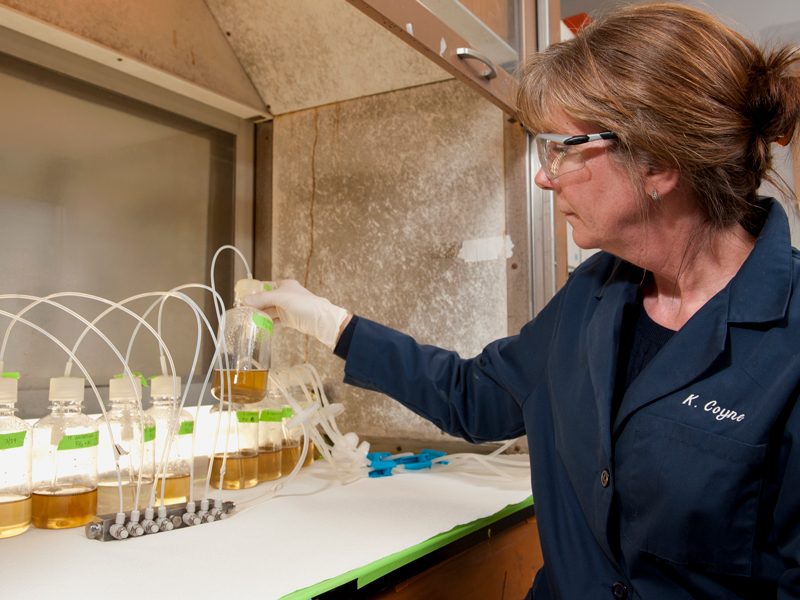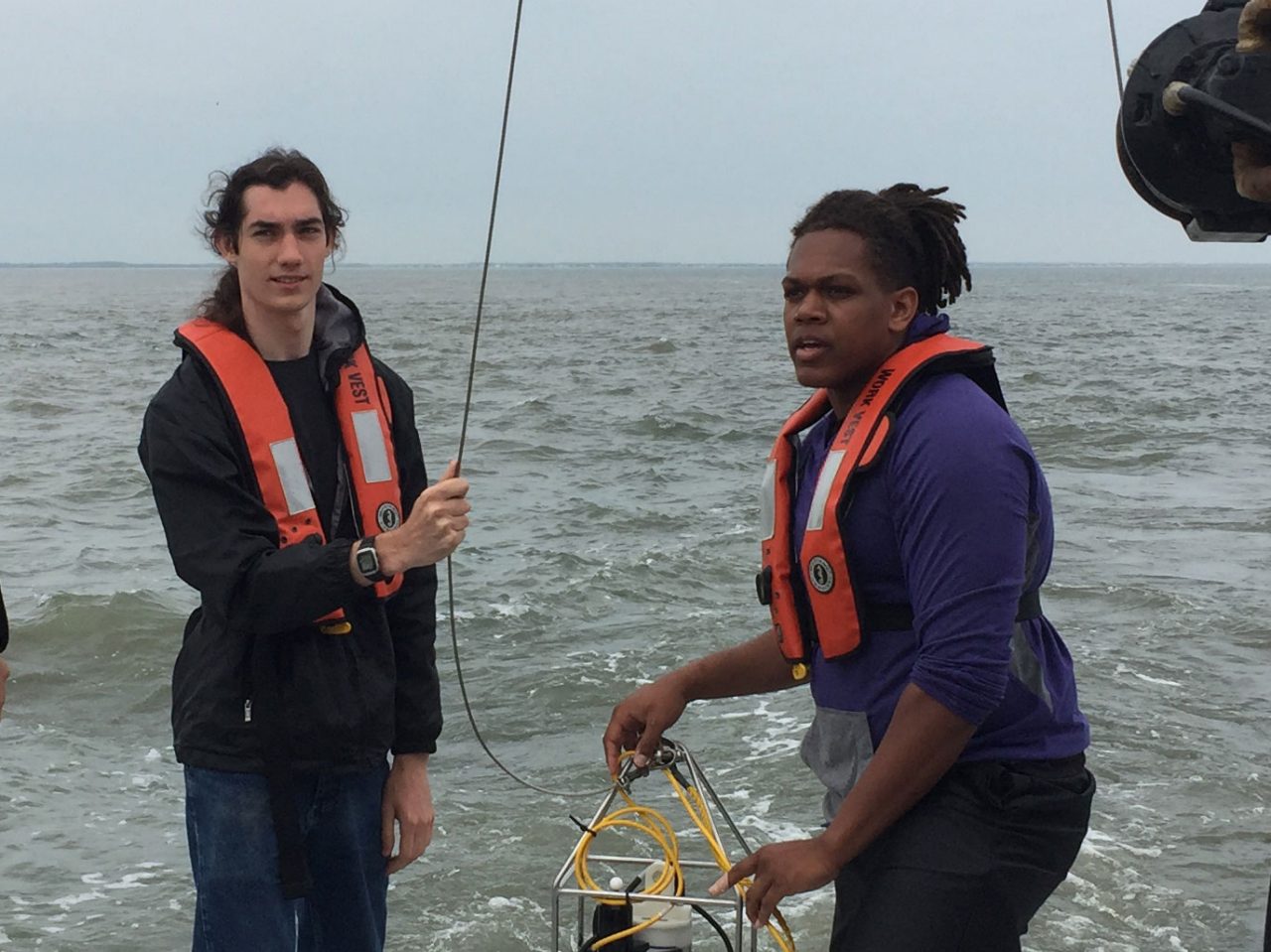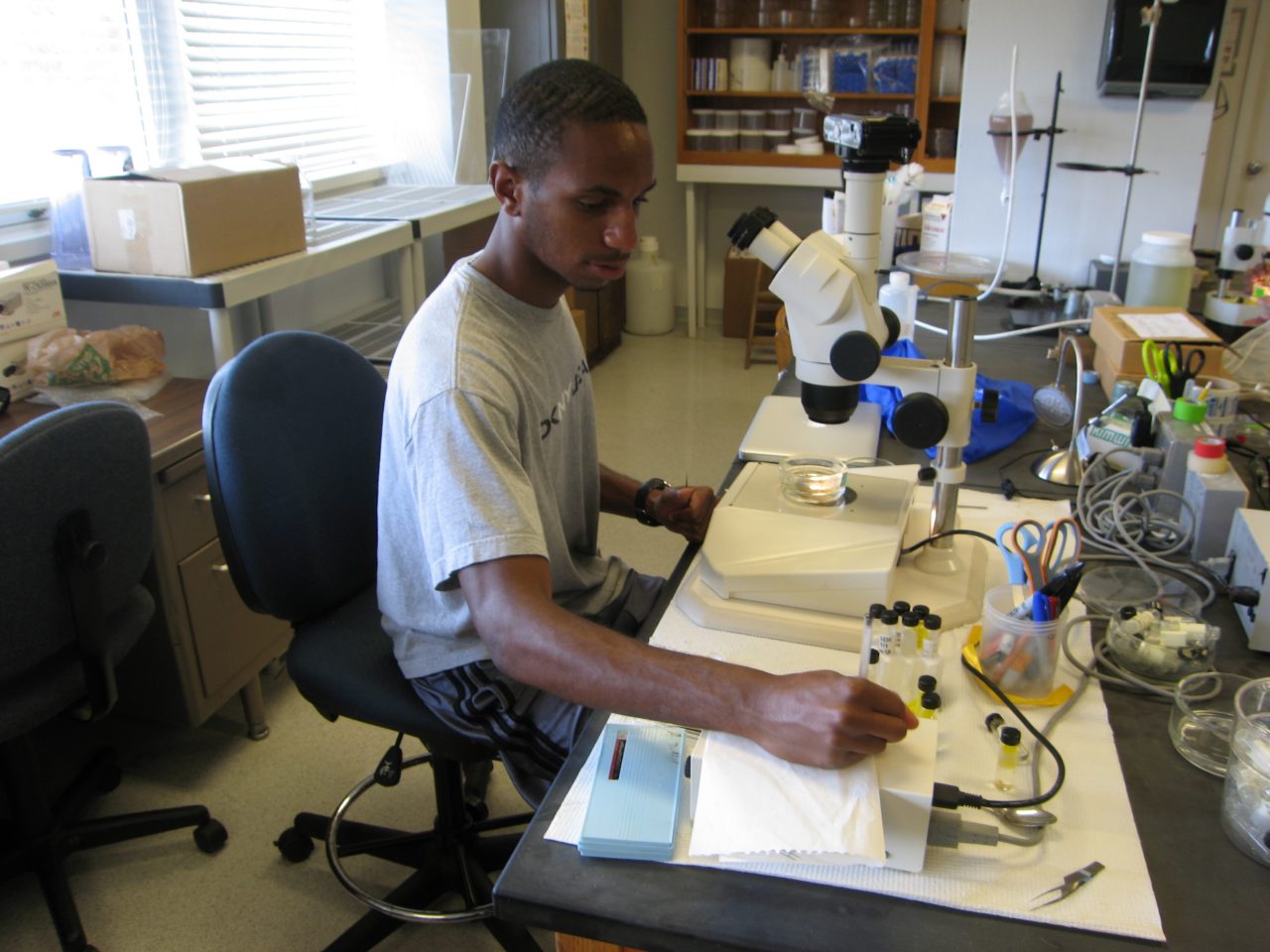
Marine Sciences Summer REU Program

Supported by a grant from the National Science Foundation's Division of Ocean Sciences, this Research Experiences for Undergraduates (REU) program offers undergraduates in STEM an opportunity to conduct guided research internships in marine science.
Under the guidance of a faculty mentor, interns work in a research-intensive atmosphere on a topic in chemical, physical, or biological oceanography or marine biology/geology/ biogeochemistry. The program includes weekly research seminars, professional development presentations, and field trips to nearby coastal marine systems. Interns will also present written and oral reports at the close of the program. For more information, contact Dr. Joanna York at jyork@udel.edu or 1-302-831-7040.
The Summer 2026 program will run for 10 weeks from Monday, June 8 to Friday, August 14. Student support includes a $7,950 stipend, free housing, and travel assistance for the 10-week program.
Who can participate
Participants must be currently enrolled in a program leading to an undergraduate degree, as well as U.S. citizen or legal permanent resident. Students from community colleges and institutions with limited research opportunities are especially encouraged to apply.
Where we study
Research and teaching facilities are located at UD’s Hugh R. Sharp Campus in Lewes, DE. Interns live at the Daiber Housing Complex, which is fully furnished with washer, dryer, air-conditioning and Wi-Fi. The complex is less than 2 miles from the Hugh R. Sharp Campus and within walking distance of downtown Lewes.
How to apply
Please apply via the NSF Education Training and Application Portal (ETAP). Applications are due by February 13, 2026. The application requires:
- Application form
- Short essays
- Unofficial Transcript(s)
- One (1) reference letter
Program Features

Faculty Mentors
Throughout the ten-week program, students will work with faculty mentors on a research project. Mentors provide guidance in the first weeks of the internship on selection of an appropriate project. Throughout the summer, interns are guided through the process of executing the project, possibly including field work, lab analyses, and other activities. In the final weeks of the summer, students prepare a final presentation and report, again under the supervision of their faculty mentor.

Workshops, Seminars and Field Trips
Students in the Marine Sciences Summer Program are offered workshops and seminars by faculty and research experts at the University of Delaware and throughout the field of marine science.
Workshop, Seminar or Field Trip |
Speaker |
Orientation (introductions, program overview, safety, facilities tour) |
J. York |
Field Trip: Marsh Walk |
J. York |
Meet and Greet with Graduate Students |
|
Honor, Integrity, and Responsible Conduct of Research |
J. York |
Field Trip: Rutgers Aquaculture tour with Rutgers RIOS REU students |
J. York |
Intern Presentations: Proposed Research |
All interns |
Air-Sea Interactions and Breaking Waves |
F. Veron |
Small Boat Course |
J. Swallow |
Abiotic and Biotic Chemistry at Hydrothermal Vents |
G. Luther |
Field Trip: Delaware Bay, R/V Daiber |
J. York |
How's that Data Looking? Preliminary Results Discussion |
All interns, J. York |
Communicating Results from Scientific Research |
D. Kirchman |
So, you wanna get a job someday? |
J. York |
Big Fish in a Bigger Ocean- How Do You Study Mobile Marine Predators? |
A. Carlisle |
Tour of the Robotics Discovery Lab |
A. Trembanis |
Finding New Life in the Deep Ocean |
J. Biddle |
Small Boat Practical |
J. Swallow |
Going Autonomous: Mapping Coastal Ecosystems |
A. Trembanis |
How to Find a Grad Opportunity and How to Pay for It |
J. York |
Final Presentations and Lunch |
All interns |

Summer Research Projects
Marine Sciences Summer Program interns present their research projects and findings as a part of their experience, giving them both the benefit of conducting research and that of presenting their research, skills that will prepare them for science careers.
| Name | Advisor | Title |
|---|---|---|
Ian H. |
Ed Hale |
Observer Variability in Size and Relative Abundance of Atlantic Sturgeon in the Hudson River, USA |
Nina A. |
Katharina Billups |
Tracking Antarctic Ice Sheet Variability During the Mid-Pleistocene Transition Using Ice-Rafted Debris (IRD) |
Kayla G. |
Katharina Billups |
From Debris to Data: Reconstructing Antarctic Ice Sheet Changes via Ice Rafted Debris Grain Counts |
Jessica C. |
Art Trembanis |
Assessing Storm Event and Decadal Shoreline Change in Northern Assateague from Satellite Imagery |
Linus S |
Art Trembanis |
Aquatic Vegetation Detection Across Diverse Aquatic Systems Using Low-Cost Sonar and AI Image Segmentation |
Paul H. |
Yun Li |
SWIFT: Sea-Ice-Free Wind Indicators of Flux Transitions in Western Arctic Ocean |
Leela B. |
Aaron Carlisle |
Diet Effects on Mahi-Mahi Egg Quality Through Egg Morphology and Lipid Content Analysis |
Ernest C. |
Nick Ray/ Aaron Carlisle |
Muddled and Muddy! The effects of mechanical bioturbation on gas exchange levels in Delaware salt marsh sediment |
Elise L. |
Nick Ray |
Effects of Mudsnail Bioturbation on Carbon Dioxide and Methane fluxes in Coastal Sediments |
Lex M. |
Andrew Wozniak |
The Fate of Marsh Organic Dissolved Carbon: Microbial Transformation of Dissolved Organic Matter in Coastal Waters |
Funding for this Research Experiences for Undergraduates site is provided by the National Science Foundation's Division of Ocean Sciences. The NSF contact for this program is Lindsay Martin. NSF does not handle REU applications; please contact each REU site directly for application information. This program is dependent on availability of federal funds from NSF.
